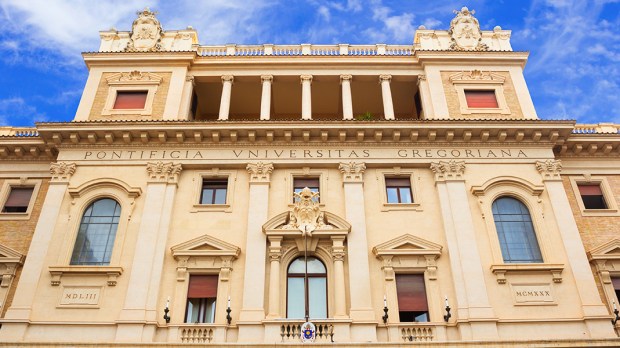The pontifical universities of Rome are joining together for the first time to offer a common curriculum — on the Christian vision of ecology.
The Gregorian University announced this today, saying that coursework for formation on “Alliance for the Protection of our Common Home” would begin in November.
The material springs from Pope Francis’ encyclical Laudato Si’, which calls for the promotion of a Christian vision of ecology.
In that encyclical, the pope notes that we are “faced with an educational challenge.”
An awareness of the gravity of today’s cultural and ecological crisis must be translated into new habits. Many people know that our current progress and the mere amassing of things and pleasures are not enough to give meaning and joy to the human heart, yet they feel unable to give up what the market sets before them. In those countries which should be making the greatest changes in consumer habits, young people have a new ecological sensitivity and a generous spirit, and some of them are making admirable efforts to protect the environment. At the same time, they have grown up in a milieu of extreme consumerism and affluence which makes it difficult to develop other habits. We are faced with an educational challenge. (No. 209)
He also spoke about how an integration of various fields and disciplines is needed to bring about the Christian vision of ecology:
We urgently need a humanism capable of bringing together the different fields of knowledge, including economics, in the service of a more integral and integrating vision. Today, the analysis of environmental problems cannot be separated from the analysis of human, family, work-related and urban contexts, nor from how individuals relate to themselves, which leads in turn to how they relate to others and to the environment. There is an interrelation between ecosystems and between the various spheres of social interaction, demonstrating yet again that “the whole is greater than the part”. (No. 141)
A joint degree from the seven pontifical universities thus attempts to answer these challenges.
The program was presented to Pope Francis on 22 June. The training will result in the issuance of a full degree in ecology, and will be divided into six modules, corresponding to the chapters of Laudato Si’.
The experience is intended to be spread over five consecutive years until 2022, I.MEDIA learned. Three members of the Curia are among those advising the project, in addition to the presidents and members of the Pontifical Universities: Cardinal Peter Turkson, prefect of the dicastery on integral human development, Msgr. Jorge Carlos Patron Wong, secretary of the Congregation for the Clergy, and Father Friedrich Bechina, undersecretary of the Congregation for Catholic Education.
Benedict XVI, often dubbed the “green pope,” was a strong advocate of a Christian vision of ecology and what he called a “human ecology.”
In 2010, for example, in his message for that year’s World Day of Peace, he offered this reflection:
The Church has a responsibility towards creation, and she considers it her duty to exercise that responsibility in public life, in order to protect earth, water and air as gifts of God the Creator meant for everyone, and above all to save mankind from the danger of self-destruction. The degradation of nature is closely linked to the cultural models shaping human coexistence: consequently, “when ‘human ecology’ is respected within society, environmental ecology also benefits”. Young people cannot be asked to respect the environment if they are not helped, within families and society as a whole, to respect themselves. The book of nature is one and indivisible; it includes not only the environment but also individual, family and social ethics. Our duties towards the environment flow from our duties towards the person, considered both individually and in relation to others.
Hence I readily encourage efforts to promote a greater sense of ecological responsibility which, as I indicated in my Encyclical Caritas in Veritate, would safeguard an authentic “human ecology” and thus forcefully reaffirm the inviolability of human life at every stage and in every condition, the dignity of the person and the unique mission of the family, where one is trained in love of neighbour and respect for nature. There is a need to safeguard the human patrimony of society. This patrimony of values originates in and is part of the natural moral law, which is the foundation of respect for the human person and creation.
September 1 is the World Day of Prayer for the Care of Creation, instituted by Pope Francis in 2015.

